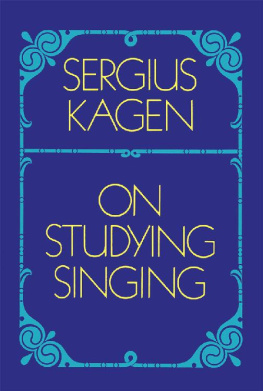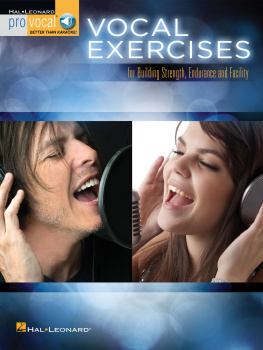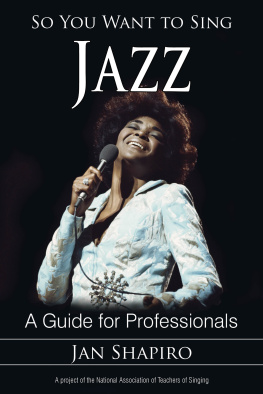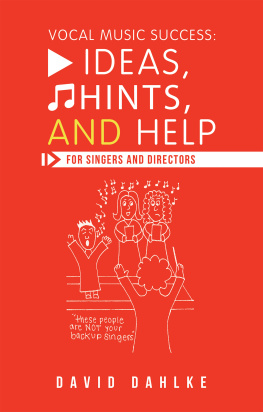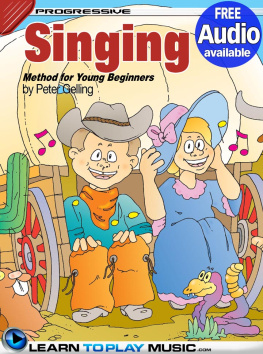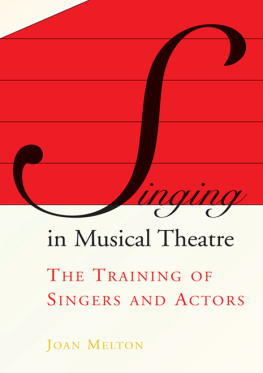ON
STUDYING SINGING
by SERGIUS KAGEN
DOVER PUBLICATIONS, INC.
NEW YORK
Copyright 1950 by Sergius Kagen.
All rights reserved.
This Dover edition, first published in 1960, is an unabridged and unaltered republication of the work originally published bv Rinehart & Company, Inc. in 1950
Standard Book Number eISBN 13: 978-0-486-17260-6
Library of Congress Catalog Card Number: 61-431
Manufactured in the United States by Courier Corporation
20622X21
www.doverpublications.com
Preface
Anyone who has had the opportunity to observe and work with a number of young people studying singing no doubt knows the singular confusion and the extraordinarily haphazard manner in which most of them seem to approach their task.
It seemed to me that a short book which would discuss the nature of the general problems of studying singing, and some ways of procedure and approach which might assist the student in solving such general problems, would in turn help the student to help himself.
This little book deals primarily with the following matters: the nature of the minimal natural equipment which this writer considers indispensable to the serious study of singing; the scope and purpose of the various branches of studies involved in studying singing (such as music, languages, vocal technic, etc.); and, finally, the basic procedures a student may adopt in trying to master any of these subjects.
It is not intended to teach the student how to sing; no book could possibly do this. Its main purpose is to help him find a way to study singing intelligently.
Table of Contents
ON STUDYING SINGING
I. The Musical Ear and the Natural Voice
Singing is essentially a very simple and normal activity. Anyone who can carry a tune and is capable of producing pleasing sounds with his voice can sing. The study of singing is often considered a formidable and exacting undertaking that requires years of unremitting toil. This attitude toward the study of singing is warranted only if it is applied to those who have no natural aptitude nor talent. For those who do possess enough natural aptitude and talent, the study of singing can be an extraordinarily simple process. The pursuit of perfection in singing and the study of all the related subjects necessary for perfection can never cease; however, the fundamentals of singing necessary for professional activity are so simple that they can sometimes be acquired in a surprisingly short time, provided, of course, one is sufficiently well endowed.
Practically every normal person can sing after a fashion. One does not even necessarily have to study singing or music to be able to do so. Nearly every person who can sing after a fashion can improve his singing by proper study to some certain limited degree. Limited degree is used here advisedly. It matters little how ardently one may desire to learn to sing beautifully or how long and strenuously one may be willing to study to attain this goal. If one's natural endowment hap pens to be inadequate, no amount of wishing or working will change it any more successfully than wishing or working will change the color of one's eyes. Not many people possess enough natural endowment to hope to go beyond this limited degree of improvement. Of these few, only a handful may be fortunate enough to possess, at least to some degree, most of the mental, personal and physical qualifications indispensable to those who hope to become professional singers. I should like to define a professional singer rather narrowly as one whose income is derived from singing for other people.
In my experience, I have become aware of the fact that too many young people who hope to become professional singers believe too much in and expect too much from the processes of study.
Study in the performing arts is indispensable and allimportant if its purpose is to bring under control and thus improve and put to use certain faculties which the student already possesses. Study as such, however, cannot be expected to endow the student with faculties he may not possess by nature. Study can make a gifted person use his gifts more efficientlyit cannot make an ungifted person less ungifted. In the performing arts, abundant natural endowment is the only foundation upon which any hope for future professional activity can be based. It seems reasonable to assume then that the amount, quality and intensity of study can produce results only in direct ratio to the amount of natural aptitude and talent a student may possess.
All this is not meant to imply that unless one has an extraordinary gift one should not study singing. On the contrary, I believe that any and every person will undoubtedly benefit and derive great pleasure from the study of the fundamentals of this art. However, being able to sing after a fashion offers no basis for much hope for a professional future.
It is a regrettable fact that the number of those who admit to be amateur singers is growing steadily smaller while the number of those who pretend to be professionals is growing steadily larger. It seems as though practically everyone who ever took a few lessons in singing has the hope to become a professional. These hopes are often based on the singular idea that intensive and expensive study will furnish one with the faculties nature may have denied him.
It may safely be said that in no branch of human endeavor is the lack of natural endowment more painfully apparent than it is in the arts. It may further be said that in no branch of the arts is a trained but ungifted person as pitifully inadequate as he is in music. One could add that in no branch of music is the possession of superior natural endowment more indispensable than it is in singing.
Every person who desires to study singing for the purpose of making it his profession ought to do his very utmost to discover how much natural endowment he may possess before he considers such a step seriously. Singing for one's own pleasure demands only the desire to sing; singing for other people's pleasure demands certain standards of excellence. Professional singing, however, is an entirely different undertaking. To begin with, it is a competitive activity. The standards of excellence are as high as the greatest singers of the generation may happen to set them. Nothing but an unusual natural gift plus the most exacting control of it attained through the proper study can hope to compete under such circumstances.
We have no scale of measurements which would enable us to ascertain the presence and the quality of talent. Talent seems to be the sum total of so many intangibles that it defies definition. We still know too little about ourselves even to attempt a profitable discussion of such intangibles. It has been aptly said that talent is conspicuous by its absence; but in singing, perhaps much more easily than in any other branch of the performing arts, one may describe certain natural aptitudes, the possession of which would seem indispensable to any vocal student who wishes to acquire even the very lowest form of professional competence. In discussing such aptitudes, we need not even touch on the subject of talent. The possession of such aptitudes may or may not go together with the possession of a talent. In the performing arts, however, any practical use of a talent seems unthinkable when most of such aptitudes are absent.
The terms natural aptitude, endowment, ability or equipment are used here to designate certain mental and physical traits necessary for singing which the individual possesses before he begins to study.
The origin of such traits is of little importance in so far as this particular discussion is concerned. We have as yet no means to establish precisely how such traits originate. They may be inherited, they may be the result of environmental conditions or they may have been developed in infancy or early childhood by the individual himself. Countless other factors are no doubt involved in producing such natural fitness for any art.

